Indonesia – 28th September 2021, An estimated US $ 50 billions in fresh financing can be unleased through Green Sukuk to meet the UN’s ambitious Sustainable Development Goals (SDG) and Climate Change commitments, according to a new report published today by the United Nations Development Programme (UNDP), and the Islamic Finance Council UK (UKIFC). Green sukuk is a key instrument of Islamic finance.
The report’s launching came less than six weeks before the UN Climate Summit (COP26) in Scotland. The Summit brings together world leaders to hammer out a deal to reduce greenhouse gases and adapt to the impacts of climate change. Packed with analysis of the global Sukuk market, the report demonstrates how green sukuk bonds can provide a significant portion of the US$100bn in climate finance required for developing countries.
According to the report, entitled ‘Innovation in Islamic Finance; Green Sukuk for SDGs’, the fresh funding of US$30-50bn from green and sustainability Sukuk can be raised by as early as 2025.
UKIFC Managing Director Omar Shaikh presented the report’s findings to over 500 senior finance leaders at the first Islamic Finance and the Sustainable Development Goals Virtual Global Summit today. UNDP Indonesia Deputy Resident, Sophie Kemkhadze also took part in the Summit by sharing some examples of Islamic Financed-SDG projects in Indonesia, world’s largest Muslim nation by population.
Sales of new green sukuk (Islamic bonds) have grown from US$500m in 2017 to US$3.5bn in 2019. The Republic of Indonesia (ROI), in partnership with the UNDP, issued the world’s first Government green sukuk in March 2018 (raising US$1.25bn) and the world’s first retail green sukuk in November 2019 (raising IDR1.4trn or USD$104.4m). To date, Indonesia’s sovereign green sukuk has mobilized over US$3.9 billion towards the country’s climate change mitigation and adaptation efforts.
“This report comes at the critical juncture as the world is embarking in recovery from the COVID-19 pandemic which had forced to re-purpose public financing resources in countries around the world, including in Indonesia, further widening existing financing gap for SDGs and climate change commitments. Packed with best practices and in-depth analysis from the 2018 and 2019 Green Sukuk issuances in Indonesia and Malaysia, this report presents a compelling case for countries to consider opportunities of Islamic finance—specifically green sukuk—to raise additional funds in meeting their commitments in SDGs and Climate Change.As the clock ticks towards 2030, it is hoped that this report could encourage other countries to adopt Green Sukuk as an innovative approach to finance their SDGs and green development.” Said Sophie Kemkhadze, Deputy Resident Representative, UNDP Indonesia.
“This report presents a unique opportunity to explore the role of green sukuk in the context of climate change and the green economy. It highlights the potential of green sukuk to attract investment at scale to projects that reduce national greenhouse gas emissions in line with the Paris Agreement. Based on the work we have undertaken for this report we estimate an additional US$30 to 50bn of capital towards the SDGs can be raised by 2025 through green and sustainability sukuk.To unlock this finance, as a direct follow-up to this report, the UKIFC has committed to launching a High Level Working Group at COP26 that will coordinate international efforts to develop the green/sustainability sukuk market.” Said Omar Shaikh, Board Member, UKIFC.
The report delves into the best practice for green sukuk in the ROI and other Islamic finance regions.
REPORT FINDINGS:
- Upfront investment is needed to develop a green framework and independent certification to assure investors that green sukuk are not greenwashing.
- Demand from western global investors for Environmental, Social, and Corporate Governance (ESG) investments gives green sukuk the opportunity to attract major new investors who otherwise would not have considered sukuk for their portfolios.
- Green or sustainability sukuk might lower the cost of raising vital climate finance. Malaysia has seen the largest volume of sukuk issuances supported and facilitated by a number of Government initiatives.
- Indonesia has a very limited corporate sukuk market and has not seen any corporate green sukuk issuances. There is a need to ensure sukuk have a level playing field with no additional burdens in comparison to conventional bonds; in addition, tax incentives could encourage corporate sukuk issuances.
- The opportunity is there for Shariah scholars to positively influence ESG aspects as part of their Shariah review of sukuk issuances.
- A challenge within the Islamic finance industry is the general lack of experience and depth of knowledge in relation to ESG matters. It is recommended that organisations such as the Accounting and Auditing Organization for Islamic Financial Institutions to take a lead and develop guidance for Shariah scholars.
The principles of Islamic finance are underpinned by the objectives of Islamic law and match many of the aims and objectives of the agenda for Sustainable Development Goals (SDGs) adopted by all United Nations member states in 2015 to provide a shared blueprint for an urgent call for action by all countries to end poverty, improve health and education, reduce inequality, and spur economic growth – all while tackling climate change and working to preserve our oceans and forests.
The report demonstrates how this unique alignment of the SDGs and Islamic finance provides a clear opportunity for green sukuk to bridge the gap in private sector finance needed to meet countries’ climate targets and accelerate achieving their wider sustainable development agenda.
-
For more information:
Muhammad Didi Hardiana – muhammad.hardiana@undp.org
Chris Tait - chris@ukifc.com / +44(0)7931 103573

 Locations
Locations
